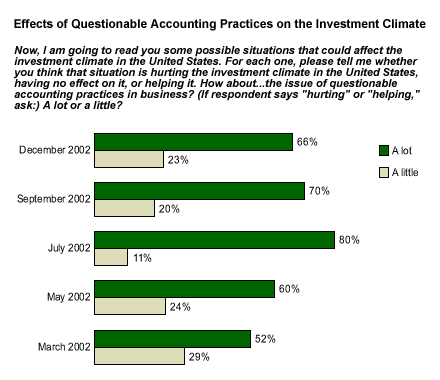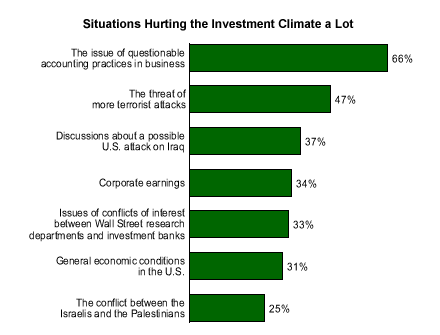As 2003 begins, U.S. investors have many reasons to worry. The geopolitical situation is extremely unsettling because of the potential for war with Iraq and the increased threat from North Korea, in addition to the ever-present possibility of new terrorist attacks. Add in very disappointing U.S. holiday sales and the potential for a weak world economy in early 2003, and it is little wonder that many investors are turning to gold -- gold proxies -- and commodities as safe havens.
Still, the biggest business stories of 2002 took place not abroad, but right here in the United States as corporate scandals raised the issues of questionable business accounting and conflicts of interest on Wall Street. Those who have followed business news coverage in the final months of 2002 may have drawn the conclusion that these issues have receded from investors' radar screens and been replaced by geopolitical concerns. If you ask investors, however, they say that the issue of corporate corruption -- in all of its various manifestations -- continues to be a major negative for the investment climate as we start the new year.
Corporate Corruption Remains a Major Issue . . .
According to the December Gallup/UBS Index of Investor Optimism survey*, two-thirds of investors (66%) think that the issue of questionable accounting practices in business is still hurting the U.S. investment climate "a lot." Amazingly, this is down only four percentage points from September, when 70% of investors said questionable accounting was hurting the investment climate "a lot." In fact, more investors say they are worried about accounting issues right now than did so in May, when 60% of investors said this problem was hurting the investment climate "a lot."
Also surprising is the finding that 89% of investors think these issues are hurting the investment climate either "a lot" or "a little' -- virtually the same as September's 90% and July's 91%. This combined measure is also higher than it was in May (84%) and March (81%).

. . . And, Still Dominates Other Issues
One in three investors also says that the issue of conflicts of interest between Wall Street firms' research departments and investment banks is hurting the current investment climate "a lot." This is down slightly from September's 36% and July's 42%, but essentially the same as the percentage of investors who are worried about corporate earnings (34%) and general economic conditions (31%). And, the percentage worried about such conflicts of interest is still higher than it was in May (28%).
Of course, there are many other issues that more than a third of investors say are hurting the U.S. investment climate "a lot," including: corporate earnings, talk of a possible U.S. attack on Iraq, and the threat of more terrorist attacks.

Key Points
Many troubling issues continue to negatively affect the U.S. economy and the stock market. Of course, uncertainties create all kinds of risk premiums and related costs for the economy. The potential for eliminating these premiums probably explains why 43% of U.S. investors tell Gallup that if the United States invades Iraq, it will have a very positive (9%) or somewhat positive (34%) effect on the U.S. economy. On the other hand, the 47% of investors who say such an invasion would have a very negative (16%) or somewhat negative (31%) effect probably fear the impact of an actual war on the U.S. economy more than the costs of uncertainty generated by a potential war.
Still, while the nation's policy-makers deal with today's plethora of international uncertainties, it would be wise for them to remember that the U.S. investor psychology remains very fragile as we begin 2003. Even though the press has focused on many other issues for several months, the overwhelming majority of investors still suffer from a serious loss of confidence in our equity and corporate debt markets.
*Results are based on telephone interviews with 1,000 investors, aged 18 and older, conducted Dec. 1-15, 2002. For results based on the total sample of national adults, one can say with 95% confidence that the maximum margin of sampling error is ±3%. In addition to sampling error, question wording and practical difficulties in conducting surveys can introduce error or bias into the findings of public opinion polls.

